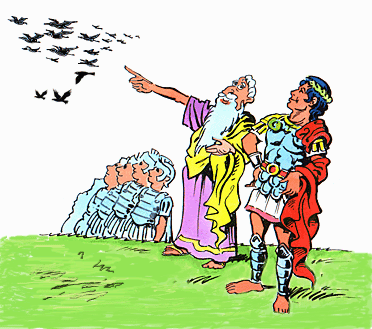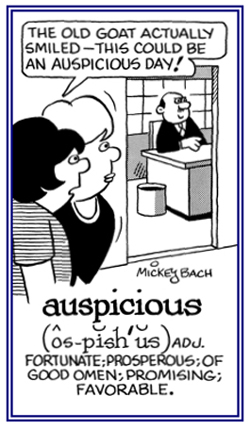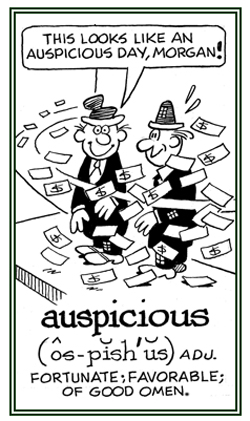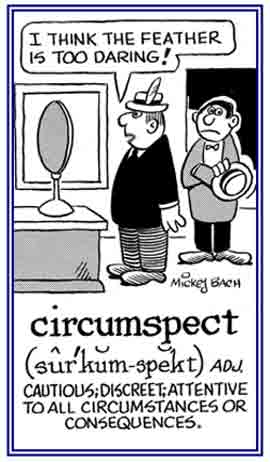spec-, spic-, spect-, spectat-, spectro- -spectr, -spectful, -spection, -spective
(Latin: to see, seeing; to look at, looking at; sight, to appear, appearing; to behold, to examine, examining)
2. Attended by favorable circumstances; propitious: Since the company was making so much money, it seemed to be an auspicious time for Mike to ask for a raise in salary, especially since he was one of the most successful salesmen.
3. Refering to something that promises success; propitious; opportune; favorable: It was an auspicious occasion when Mark's and Mary's twins were born in two separate years. The first one was born one minute before midnight in 2013 and the other one was born one minute after midnight in 2014.
4. Concerning something favored by good fortune and prosperity: Because of her beautiful and unique art work, Madeline experienced more auspicious sales than she had ever experienced before.
5. Descriptive of a good omen or prophetic sign indicating, or suggesting, that future success is possible: It was an auspicious time for Randy's uncle to start his new business because there was a significant demand for the products he was producing.

Favorable omens came to be known as auspicious while unfavorable signs were considered inauspicious.
In Roman times, an "augur" was a person who foretold the future by observing the birds flying in the sky. "Auspicium" became a divination (fortune telling) which involved watching the birds as they were soaring in the air and came from "auspex", someone who interprets signs from the movements of birds.A Latin derivative was the verb "inaugurare", to foretell the future from the flight of birds, which was applied to the installation of someone in office after the appropriate omens, or predictions, had been determined.
By the time "inaugurare" reached English, as "inaugurate", the association with the divination of birds had been forgotten.
An ancient Roman priest, or "auspex", was appointed to foretell or to divine the future outcome of an important event by observing how the birds were passing around, listening to their songs, observing the food they ate and sometimes by examining their internal organs.
Later the Roman "auspex" was replaced with the term "augur" as the interpreter-observer of bird signs; his name being derived from the Latin avis, "bird", and garrire, "to talk" or "to explain".
The augur's interpretation, or "augurism", became the English word "augury", an omen (prophecy, prediction), and the Latin "inaugurare", to install an official after consulting the birds, became the word we use to install politicians in office with the hope that their inaugurations will prove to be auspicious instead of consisting of political plots, schemes, and intrigues.


Go to this Word A Day Revisited Index
so you can see more of Mickey Bach's cartoons.


A click on one of the images will take you to the pages where these images and related words are located.
An auspex interpreted the flight of birds as auspicious for the Romans to begin a new battle; however, he later divined that the birds had shown the situation to be inauspicious.
In school, Ralph found out that in Roman times auspicy was practiced among people to find out how certain political situations were to be decided upon. Romulus and Remus, for example, decided to end their discussion about where to build the city of Rome by checking out how many vultures they saw while sitting on the ground.
2. A species defined primarily on biological characteristics: "An interesting fact of biospecies is that it establishes the likeness of DNA of people, or groups of people. One technique is using genetic fingerprinting."
2. Relating to a something that is seriously considered: Shirley thought about her future after graduating from college with circumspect deliberations.
3. Marked by attention to all situations and probable consequences; being careful and sensible with professional advice: While figuring out her finances, Yvonne was very circumspect not to make a mistake with her investments.



Go to this Word A Day Revisited Index
so you can see more of Mickey Bach's cartoons.
2. The trait of being observant and prudent: "Circumspection was typical of Roger because he always thought through each situation before he decided to get involved with it."
3. The ability to know how to avoid embarrassment or distress by thinking about possible risks before doing or saying something: "A good turn of circumspection saved Heather from being embarrassed before she thanked the wrong person for the wonderful invitation that she received to attend the celebration of the international sports event."

A soldier is circumspectly watching and cautiously striving to see if there is any danger lurking in the forest.
Cross references of word families that are related directly, or indirectly, to: "appear, visible, visual, manifest, show, see, reveal, look": blep-; delo-; demonstra-; opt-; -orama; pare-; phanero-; phant-; pheno-; scopo-; vela-, veal-; video-, visuo-.


